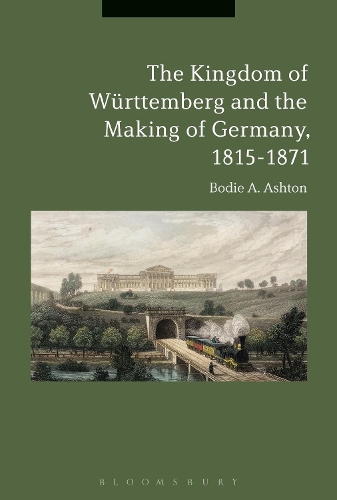
The Kingdom of Wrttemberg and the Making of Germany, 1815-1871
(Hardback)
Available Formats
Publishing Details
The Kingdom of Wrttemberg and the Making of Germany, 1815-1871
By (Author) Dr Bodie A. Ashton
Bloomsbury Publishing PLC
Bloomsbury Academic
12th January 2017
United Kingdom
Classifications
Tertiary Education
Non Fiction
943.07
Physical Properties
Hardback
240
Width 156mm, Height 234mm
517g
Description
CHOICE Outstanding Academic Title 2017 This book examines the 1871 unification of Germany through the prism of one of its forgotten states, the Kingdom of Wrttemberg. It moves beyond the traditional argument for the importance of the great powers of Austria and Prussia in controlling German destiny at this time. Bodie A. Ashton champions the significance of Wrttemberg and as a result all 38 German states in the unification process, noting that each had their own institutions and traditions that proved vital to the eventual shape of German unity. The Kingdom of Wrttemberg and the Making of Germany, 1815-1871 demonstrates that the states government was dynamic and in full control of its own policy-making throughout most of the 19th century, with Ashton showing a keen appreciation for the states domestic development during the period. The book traces Wrttembergs strong involvement in the national question, and how successive governments and monarchs in the states capital of Stuttgart manoeuvred the country so as to gain the greatest advantage. It successfully argues that the shape of German unification was not inevitable, and was in fact driven largely by the desires of the Mittelstaaten, rather than the great powers; the eventual Reichsgrndung of January 1871 was merely the final step in a long series of negotiations, diplomatic manoeuvres and subterfuge, with Wrttemberg playing a vital, regional role. Making use of a wealth of primary sources, including telegrams, newspaper articles, diary entries, letters and government documents, this is a vitally important study for all scholars and students of 19th-century Germany.
Reviews
Bodie A. Ashton makes an important contribution to the German and regional history of the 19th century with his book. It is recommended. * H-German *
[The book] offers in a concise way a good overview of Wrttembergs room for manoeuvre and initiatives with regard to the German Question between 1815 and 1871. * German History *
This comprehensive book represents nothing less than the current state of research on the history of nineteenth-century Wrttemberg, and it will surely find readers in the other remaining Mittelstaaten as well. * European History Quarterly *
A succinct book, whose valuable contribution to the transfer of knowledge across different historiographies should be acknowledged. * German Historical Institute London Bulletin *
This is a clearly presented, well-researched, and very readable account of the multifaceted role the middle-seized German state of Wrttemberg the home of Friedrich Schiller, Hermann Hesse, and Albert Einstein played in the process of German unification. Intimately familiar with the historiography, Bodie Ashton offers a fresh and interesting perspective on this rich topic. * Hermann Beck, Professor of History and International Studies, University of Miami, USA *
This is a very welcome contribution to nineteenth-century German history. Bodie Ashton's new study of the small South-west German state of Wrttemberg retells the history of the movement for German unification from an unfamiliar vantage point. In calling into question some of the assumptions of an older body of literature, Ashton gives us the benefit of a more plural and more open-ended history of German unification, at the same time as demonstrating why some alternative ideals of the nation-state ultimately failed. * Andrew Bonnell, Associate Professor in History, University of Queensland, Australia *
It is hard to give this book sufficient praise; lucid and thoroughly researched, it brings the past to life, and the sections on politics, economic growth (or the absence of it in southern Germany), and warfare are equally effective. If the unification of Germany came in a way that was unexpected (the author notes in closing), what came afterward was equally unpredictable. Summing Up: Highly recommended. Upper-division undergraduates and above. * CHOICE *
Author Bio
Bodie A. Ashton is the Professional Academic Editor for the European Research Council-funded ReConFort project at the Universitt Passau, Germany. He is also a Visiting Research Fellow at the University of Adelaide, South Australia, and has taught extensively at Adelaide and Flinders University of South Australia in modern European history, imperialism, colonialism, protest, and revolution.
